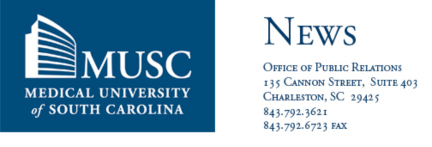

Dec. 27, 2012
CHARLESTON – On Thursday, December 6, 2012, the Community Advisory Board for the South Carolina Clinical and Translational Research Institute’s Center for Community Health Partnerships (SCTR/CCHP), at the Medical University of South Carolina (MUSC), hosted a leadership summit bringing together 91 key representatives from across the tri-county region. Invitees were selected based on their commitment to enriching and improving the greater Charleston area’s approach to conquering the region’s obesity epidemic.
The South Carolina Clinical and Translational Research Institute (SCTR) and MUSC’s Boeing Center for Children’s Wellness sponsored the event. Representatives from non-profit organizations, schools, media, academic institutions, community and advocacy groups, city and state representatives, hospital systems, private foundations, and individual community leaders combined efforts to identify evidence-based approaches and innovative solutions across the region and state of South Carolina. Designated topics were based on recommendations by the Institute of Medicine (May 2012), which included integrating physical activity into daily living, making healthy food options available everywhere, marketing what matters for a healthy life, activating employers and health care professionals, and strengthening schools as the heart of health. A sixth topic, measuring community progress, was also included for evaluation and research purposes.
Karl F. Dean, mayor of Nashville and Davidson County, Tennessee and Christopher Kerrigan, president and CEO of Trident United Way, keynoted the event. Panels, discussion groups and breakout sessions ensured collaboration and facilitated a coordinated community response. Efforts were made to identify the potential for early successes and leverage previous lessons learned to prioritize resources.
“I applaud the Obesity Summit organizers for choosing such a broad cross section of groups to be represented. I think that it’s clear that for an issue this broad, it’s going to at least require a range of people to come together to address it. I’m very impressed with what’s been accomplished already in your time together. The real test is what happens subsequent to this meeting,” said MUSC President Raymond Greenberg, MD, PhD, a panelist.
“By addressing this issue in such a comprehensive way, we stand to make major inroads on conquering the obesity epidemic. We are optimistic that our focus on goals with the greatest scientific opportunity and challenge will create opportunities to expand the knowledge base on this complex, multi-faceted disorder,” said Cathy Melvin, PhD, MPH, associate director, SCTR/CCHP, and Department of Medicine, MUSC.
At the conclusion of the event, representatives volunteered to participate in action teams to develop tangible action plans. These action teams will recommend subsequent steps for community-led action and research in the next six months. For more information on the obesity summit efforts, and to get involved, visit sctr.musc.edu.
About SCTR
The South Carolina Clinical and Translational Research Institute (SCTR) of the Medical University of South Carolina is the catalyst for changing the culture of biomedical research, facilitating sharing of resources and expertise, and streamlining research-related processes to bring about large-scale change in the clinical and translational research efforts in South Carolina. The SCTR Institute was established in 2006 in response to the National Institutes of Health (NIH) Clinical and Translational Science Award (CTSA) Program, grant UL1 TR000062. The CTSA program is led by the NIH’s National Center for Advancing Translational Sciences (NCATS). For more information, visit sctr.musc.edu.
About MUSC
Founded in 1824 in Charleston, The Medical University of South Carolina is the oldest medical school in the South. Today, MUSC continues the tradition of excellence in education, research, and patient care. MUSC educates and trains more than 3,000 students and residents, and has nearly 11,000 employees, including 1,500 faculty members. As the largest non-federal employer in Charleston, the university and its affiliates have collective annual budgets in excess of $1.7 billion. MUSC operates a 750-bed medical center, which includes a nationally recognized Children's Hospital, the Ashley River Tower (cardiovascular, digestive disease, and surgical oncology), and a leading Institute of Psychiatry. For more information on academic information or clinical services, visit www.musc.edu or www.muschealth.com.
#####